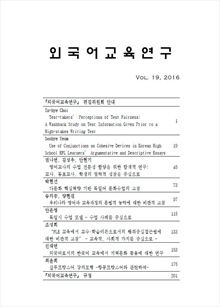간행물
외국어교육연구 Foreign Language Education Research

- 발행기관 서울대학교 외국어교육연구소
- 자료유형 학술지
- 간기 반년간
- ISSN 1229-5892 (Print)
- 수록기간 1998 ~ 2018
- 주제분류 사회과학 > 교육학 사회과학 분류의 다른 간행물
- 십진분류KDC 705DDC 405
권호리스트/논문검색
제5호 (2002년 12월) 5건
1.
2002.12
구독 인증기관 무료, 개인회원 유료
English language teaching in elementarγ school was proposed and is now in practice on the basis of the Critical Period Hypothesis which is also theoretically supported by innatists who argue that UG begins attrition around puberty and that language acquisition becomes increasingly difficult beyond this period. This was proved true of first language acquisition and naturalistic SLA, but no evidence has been known about instructed second language leaming in formal education. Elementary school ELT is supported by some parents who wish their children to leam this world language effectively, but the educational environment is far from utilizing the leamers' UG: few teachers are capable of providing authentic input, so the leamers depend on their general intelligence and leaming strategy rather than UG. It is suggested that high school age is optimum for utilizing leamers' motivation, intelligence, and leaming strategy.
4,200원
2.
2002.12
구독 인증기관 무료, 개인회원 유료
The main goal of this study is to review the role of the age factor in foreign language education and to discuss its implications in Korean English education. ‘The younger, the better', under the critical period hypothesis, has recently played a critical role in the introduction of English language education to young children in Korea and the public and the govemment seem to be highly dependent upon the hypothesis when they decide children’s English education. For example, the English education program in Korean elementary schools is an offspring of this theory. This study, however, casts a doubt on the effect of age on English education by reviewing theoretical and experimental studies focusing on whether age or the critical period hypothesis is a meaningful factor to validate the early exposure of foreign language education and its following success. Findings from foreign language education in US, French immersion programs in Canada and other foreign countries and adult second language leaming and studies dealing with the critical period hypothesis were critically reviewed to provide evidences to such argument that age is not a primary factor to determine early English education in Korea. On the contrary, time or the amount of exposure to the English language should be a more critical factor in a context where a very limited exposure to the target language is only possible. A list of generalizations and implications are also provided.
6,300원
3.
2002.12
구독 인증기관 무료, 개인회원 유료
Early foreign language education in Germany means language learning in primary school. The languages taught there are English or French. At this early age of six years foreign language learning is oriented on the acquisition of the native language. The knowledge of the structure of the foreign language supports the development of the native language and vice versa. Foreign language learning should therefore be comparable to the native language learning, i.e. it should be based on situation, topic, action and experience. Instruction should rely on the natural succession of the learning phases: frequent and intensive listening should precede imitative and dialogical speaking. That is what input-oriented foreign language education does in Germany in early childhood teaching.
5,100원
4.
2002.12
구독 인증기관 무료, 개인회원 유료
Language makes it possible for children to communicate with each other and has a great influence on their thinking and leaming. Since language is so closely related with children' s development of cognition and language skill, the language teaching in early infancy and the study of it have become more and more important. Language educators have realized the importance of the early Chinese teaching and its teaching method in China, where 21 million babies are bom every year. The first part of this paper focuses on the early Chinese teaching being practiced in China and gives a review of the developments of the early Chinese teaching. It combines the present situation of the early language education with "The Guidance Synopsis for Infant School Education" to find the characteristics of the early Chinese teaching. The who1e-language approach has been app1ied to the early Chinese teaching since the second half of years in 1990s. The second part of the paper studies the whole-1anguage approach to early Chinese teaching. The focus of this part is on how to app1y the approach in actua1 teaching. It gives practical examples to analyze the characteristics of the whole-language education. At last, the paper discusses some matters to be considered and problems to be solved when the who1e-language approach is applied to Chinese teaching in China. It a1so forecasts the future development of the whole-1anguage education.
5,500원
5.
2002.12
구독 인증기관 무료, 개인회원 유료
This paper aims to observe Korean learner' s understanding on two French tenses-Imperfect and Composed Past, and to grasp their diffìcultìes on tense comprehensìon applyìng on education of French tenses through the survey. The survey is conducted by three Korean learners to choose French tenses-Imperfect or Composed Past on test. This paper also argues for six principal difficulties of Korean learners whìch also requires attention of most teachers as belows: 1) Vagueness against Prototypic meanings of the two tenses which most learners possess. 2) Simple Schematization of foreground and background. 3) Variety of elements which causes terminating of verb's intervaI. 4) Confusion between Verbal lexical level and Relational level of two verbs connected. 5) Ambiguty of continuance notion. 6) Type of overlap actions 7) Influence of sentence structures which are used in the class.
6,000원

